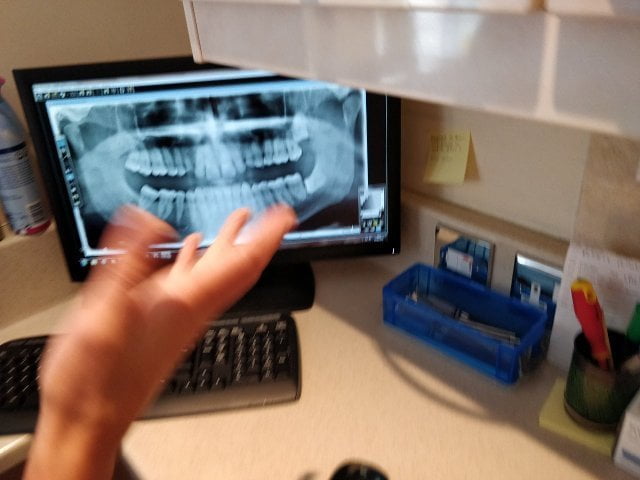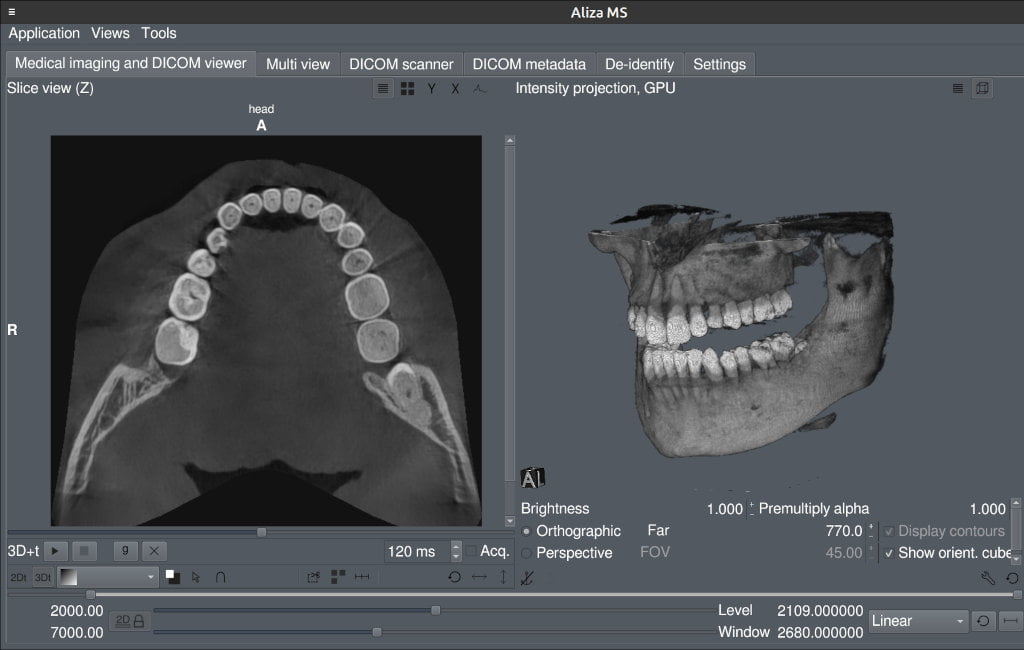I popped round to an NHS dentist a few months ago - and they stuck my head on one of these contraptions.
 The Kodak 8000C takes a panoramic X-ray, giving a superior view of your teeth. Nifty. The dentist showed me where my wisdom teeth were and I was impressed with how high resolution the image was.
The Kodak 8000C takes a panoramic X-ray, giving a superior view of your teeth. Nifty. The dentist showed me where my wisdom teeth were and I was impressed with how high resolution the image was.
Afterwards, I asked the dentist if I could have a copy of the scan. She wasn't terribly sure. She thought that she had to charge me for it. Then wondered if there was a data protection problem. Then started talking about copyright and the licence that they had signed with the machine's manufacturer.
As I'm disinclined to argue with anyone wielding a syringe and bone-saw, I asked if I could take a photo of the screen. That was acceptable to her.
 (I have a higher resolution image, but feel weird about posting it online.)
(I have a higher resolution image, but feel weird about posting it online.)
So - who owns the copyright on medical images? Some points to consider:
- The NHS is free at the point of use - but I pay a small fee for dentistry. So am I the customer?
- The dentist and assistant posed me correctly, but left the room and let the machine take my photo. Who created the image?
- I didn't sign anything about copyright.
- Could a manufacturer claim copyright of images created with their tool? What about the data they derive from analysing the image?
- Can a patient be trusted not to do anything stupid with their medical data - like post it on their blog?
As medical technology gets more sophisticated - and more Internet connected - this will become an increasing problem.
Comments from Tweeps:
Replying to @edent
@edent
Had 2 examples in last months - NHS xray of fractured finger told couldn't have image and couldn't take picture (due to social media abuse & cloning). Private MRI of knee - was told could buy the master raw images on DVD or take a masked pic on my phone of portion of the image
Replying to @edent
@edent
Completely different, but I have the originals of one of my cats x-rays. The vet said I own them, but they keep them for me because they can store them safely if I need them again. I had to sign a waiver to say I’d give them back if needed. Weird!
Replying to @psychemedia
@edent
and when I saw the image pop up as a result of my sharing the link to your dental x-ray, I felt uncomfortable at sharing it... (I don't think I'd share that sort of thing again. Personal comfort line crossed...)
Replying to @edent
@edent
My take: the radiographer acquires copyright (or their employer; not a lot of freelance radiographers around). The manufacturer does not unless assigned by contract in their T&Cs, which would be weird. You as the subject have no IP rights unless the IP owner licenses them to you.
Replying to @owenboswarva
@edent
But that's just the IP aspects of course. The x-ray contains special category personal data about you, and DP law restricts how that data can be shared and used. (Possibly fewer restrictions now you're published it, as that may affect the "special category" status of the data.)
Replying to @edent
@edent
Is there any copyright in it at all? There wouldn't be in a straight photocopy - that's different to a photograph because of the skill of the photographer in framing etc. Is an x-ray more like a photo or a photocopy? I bet the latter.
 The Kodak 8000C takes a panoramic X-ray, giving a superior view of your teeth. Nifty. The dentist showed me where my wisdom teeth were and I was impressed with how high resolution the image was.
The Kodak 8000C takes a panoramic X-ray, giving a superior view of your teeth. Nifty. The dentist showed me where my wisdom teeth were and I was impressed with how high resolution the image was. (I have a higher resolution image, but feel weird about posting it online.)
(I have a higher resolution image, but feel weird about posting it online.)











 Viewing my CT Scan in 3D using Linux
Viewing my CT Scan in 3D using Linux
patently says:
Either way, the patient doesn't own copyright - just like you don't (by default) own the copyright in a photo of you taken by a photographer.
Authorship exists under s9 of CDPA regardless, and it'll be either the dentist (or the NHS trust, if it were done in a dental hospital, or someone with a contractual relationship to the dentist) and certainly not the patient.
Whether a copyright exists at all when you face is basically scanned in a machine is a debatable point. The current test under European law whether there is an "intellectual creation" is from the Infopaq case. The British courts helpfully explicated the test in SAS v World Programming:
"The essence of the term is that the person in question has exercised expressive and creative choices in producing the work. The more restricted the choices, the less likely it is that the product will be the intellectual creation (or the expression of the intellectual creation) of the person who produced it."
Has there been expressive and creative choices? It is certainly arguable that putting someone's head in a big machine and flicking a switch doesn't quite amount to an "expressive and creative choice". Traditional radiography generally does involve some choices based on skill: often an x-ray technician may have to spend some time getting a person to be positioned in exactly the right way to photograph their particular injury, but the machine depicted above seems to have solved that problem for the dental case—you put your head in the position that the design of the machine indicates and then the machine does the rest. Ultimately, we don't really know whether copyright exists on this until a court gives us a determination on it.
If copyright does exist, it'll belong to the dentist, not the patient. It isn't work-for-hire or anything like that.
The US is an interesting contrast: the US Copyright Office's Copyright Compendium states that "the Office will not register works produced by a machine or mere mechanical process that operates randomly or automatically without any creative input or intervention from a human author", and specifically notes that they believe this category includes "medical imaging produced by x-rays, ultrasounds, magnetic resonance imaging, or other diagnostic equipment".
(That's an agency determination though and hasn't been tested in court, and so rests on Chevron deference, which may not be around for much longer since the newest Supreme Court justices don't seem so keen on the idea.)
Nicholas Oughtibridge says:
Copyright (if its a creative work) is with the photographer or their employer unless assigned through a contract, but Terence has a legal right to require a licence to use the work through DPA / GDPR subject access request.
Alex says:
Chris Rusbridge says:
Nick Mullen says:
1. https://www.nhs.uk/using-the-nhs/about-the-nhs/your-health-records/
"The information in your records can include your:
...
tests, scans and x-ray results"
https://www.nhs.uk/using-the-nhs/about-the-nhs/how-to-access-your-health-records/
which states right at the top of the page...
"There are a number of different types of health record, accessing them is free, and healthcare professionals have a legal requirement to allow you to see them."
Copyright isn't mentioned, but I think the above is enough to ensure you to have access next time you visit.
Alex says:
But I took this gruesome (you have been warned!) pic of my surgically-extracted molar myself, so it is on Wikipedia:
https://en.wikipedia.org/wiki/File:Molar_cut_up_during_extraction_-_2018-08-29_-_Andy_Mabbett_-.jpgI've tried a number of times to get the radiology department to send me what are essentially the scans of the inside of my own body. They were initially really worried due to data protection, but I did point out that, it's essentially data about me, and that I am requesting it, so that shouldn't be an issue. However, I still haven't actually received the data from them (we're talking weeks now).
They have said they would be "much happier" sending it directly to another medical professional. That's ok, to a point, but I have medical professionals in my family and close friends who are experts in the field (lucky me!) so having access to the actual images would be of personal use.
I am not asserting a copyright here, simply asserting a right to have access to and privately distribute this data for my personal medical needs.
Honestly, I think there could be some clarification needed. I think it's a similar issue. Until the advent of technology allowed the patient to be able to move and store that much medical data around (Dropbox etc... and think about medical records sitting on iCloud?), I don't think this would have been a problem, but I think it will become more and more and issue over time. What happens if private medical data is stolen due to the patient's negligence? Will a waiver have to be signed on release?
Link: shkspr.mobi/blog/2018/11/w…
Comments: news.ycombinator.com/item?id=313879…
| Reply to original comment on twitter.com
Nathan Middleton says:
Medical information is private unless chosen to be disclosed to someone else. The only other copyright involved might be on the methods used for getting the image, or the processes used in acquiring and processing the data (ie. digital code/programming). I don't see how a doctor or medical device supplier could claim ownership or proprietorship over my private data in this case. Unless bizarrely there is an agreement beforehand that this will be the case.
I would think payment for services rendered would be sufficient to give ownership. An artist doesn't own a commissioned photograph anymore than the doctor owns an x-ray.
shkspr.mobi/blog/2018/11/w…
| Reply to original comment on twitter.com
Anthony UK says:
Nik says:
Now none of this answers the question who owns the copyright; just highlights I think you hit on someone who didnt want to do an extra step and got a lot of fluff responses in return.